人教版英语七下Unit1复习思维导图
- 格式:doc
- 大小:23.50 KB
- 文档页数:1
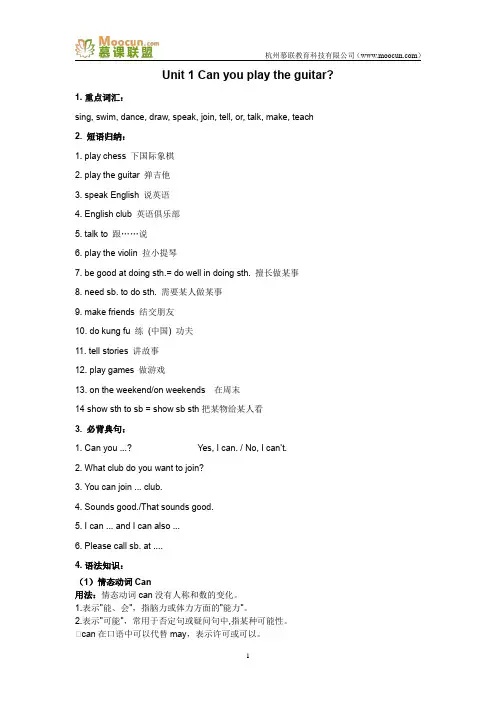
Unit 1 Can you play the guitar?1. 重点词汇:sing, swim, dance, draw, speak, join, tell, or, talk, make, teach2. 短语归纳:1. play chess 下国际象棋2. play the guitar 弹吉他3. speak English 说英语4. English club 英语俱乐部5. talk to 跟……说6. play the violin 拉小提琴7. be good at doing sth.= do well in doing sth. 擅长做某事8. need sb. to do sth. 需要某人做某事9. make friends 结交朋友10. do kung fu 练(中国) 功夫11. tell stories 讲故事12. play games 做游戏13. on the weekend/on weekends 在周末14 show sth to sb=show sb sth把某物给某人看3. 必背典句:1. Can you ...? Yes, I can. / No, I can’t.2. What club do you want to join?3. You can join ... club.4. Sounds good./That sounds good.5. I can ... and I can also ...6. Please call sb. at ....4. 语法知识:(1)情态动词Can用法:情态动词can没有人称和数的变化。
1.表示"能、会",指脑力或体力方面的"能力"。
2.表示"可能",常用于否定句或疑问句中,指某种可能性。
①can在口语中可以代替may,表示许可或可以。
①can't在口语中代替mustn't时,表示禁止或不准。

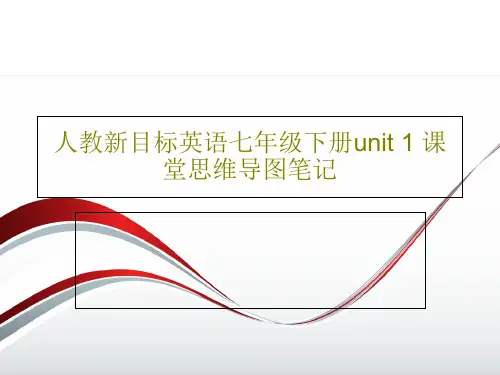
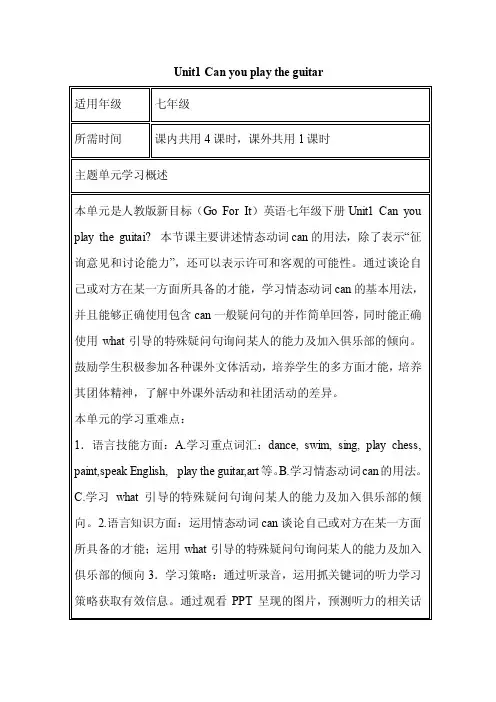
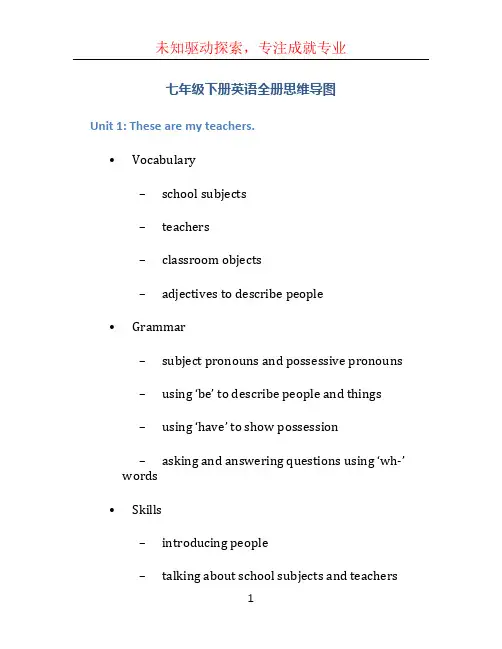
七年级下册英语全册思维导图Unit 1: These are my teachers.•Vocabulary–school subjects–teachers–classroom objects–adjectives to describe people•Grammar–subject pronouns and possessive pronouns–using ‘be’ to describe people and things–using ‘have’ to show possession–asking and answering questions using ‘wh-’ words•Skills–introducing people–talking about school subjects and teachers–describing people–asking and answering questions about possessionUnit 2: This is my school.•Vocabulary–places in a school–prepositions of place–numbers 1-1000–adverbs of frequency•Grammar–using ‘there is’ and ‘there are’–using the verb ‘have’ with objects and rooms–using prepositions to describe location–forming questions with ‘where’ and giving answers•Skills–talking about your school–giving directions in a school–describing locations–asking and answering questions about places Unit 3: How do you study for a test?•Vocabulary–school activities and supplies–adverbs of manner–adjectives to describe actions–time expressions•Grammar–using present simple tense to talk about routines and habits–using adverbs of manner to describe how things are done–using adjectives to describe actions–using time expressions to talk about frequency •Skills–talking about daily routines–discussing how to study for a test–describing actions using adjectives–expressing frequency using adverbsUnit 4: I love learning English!•Vocabulary–adjectives describing feelings–types of music–activities–opinions•Grammar–using present continuous tense to talk about actions happening now–using ‘like’, ‘love’, ‘enjoy’ to talk about hobbies and activities–using adjectives to describe feelings–expressing opinions using ‘I think’, ‘I believe’•Skills–talking about hobbies and activities–expressing likes and dislikes–describing feelings–giving opinionsUnit 5: How’s the weather?•Vocabulary–weather conditions–seasons–types of clothing•Grammar–using present simple tense to talk about weather–using ‘it’ to refer to the weather–using prepositional phrases to describe weather conditions•Skills–talking about the weather–describing seasons and clothing–making predictions about the weather–giving weather forecastsUnit 6: What’s your favorite day?•Vocabulary–days of the week–activities–ordinal numbers–adjectives to describe activities•Grammar–using ‘what’ to ask about favorite things–using ordinal numbers to talk about the order of days–using adjectives to describe activities •Skills–talking about favorite activities–discussing daily routines on different days–using ordinal numbers–describing activities using adjectivesUnit 7: I want to be a basketball player.•Vocabulary–jobs–sports–school subjects related to jobs–adjectives to describe jobs•Grammar–using ‘want to’ to talk about future plans–using ‘be going to’ to talk about future intentions–using adjectives to describe jobs–using ‘because’ to give reasons•Skills–talking about future plans and intentions–discussing different jobs–describing jobs using adjectives–giving reasons using ‘because’Unit 8: Where’s the post office?•Vocabulary–places in a city–directions–prepositions of movement–adjectives to describe cities•Grammar–using ‘Can you…’ to ask for help–using imperatives to give instructions–using prepositions of movement to give directions–using ‘there is’ and ‘there are’ to talk about places in a city•Skills–asking for and giving directions–describing places in a city–using imperatives to give instructions–talking about different citiesUnit 9: How do you make a banana smoothie?•Vocabulary–food and drinks–kitchen utensils–imperatives for cooking–adjectives to describe food and taste •Grammar–using imperatives to give instructions for cooking–using ‘how much’ and ‘how many’ to ask about quantities–using adjectives to describe food and taste–using ‘like’ to express preferences•Skills–talking about cooking and food preferences–giving instructions for making a recipe–describing food and taste–asking about quantitiesUnit 10: I’m watching TV.•Vocabulary–activities–types of TV programs–time expressions–adjectives to describe TV programs •Grammar–using present continuous tense to talk about actions happening now未知驱动探索,专注成就专业–using adjectives to describe TV programs–using time expressions to talk about frequency •Skills–discussing TV programs and activities–talking about what is happening now–describing TV programs using adjectives–expressing frequency of activities11。
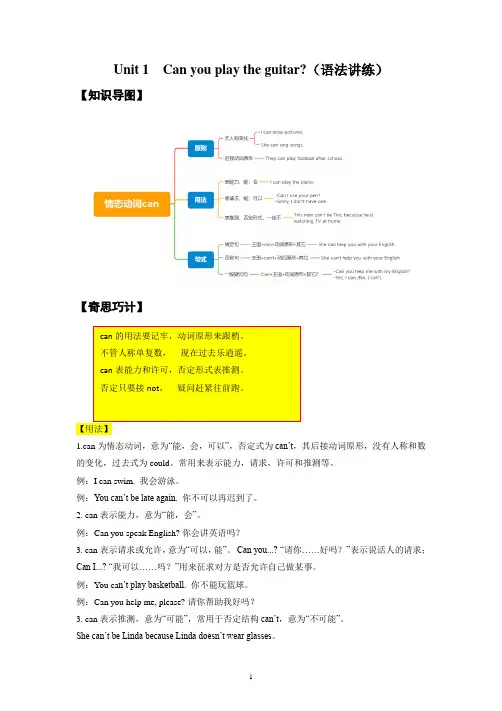
Unit 1 Can you play the guitar?(语法讲练)【知识导图】【奇思巧计】can的用法要记牢,动词原形来跟梢。
不管人称单复数,现在过去乐逍遥。
can表能力和许可,否定形式表推测。
否定只要接not,疑问赶紧往前跑。
【用法】1.can为情态动词,意为“能,会,可以”,否定式为can’t,其后接动词原形,没有人称和数的变化,过去式为could。
常用来表示能力,请求,许可和推测等。
例:I can swim. 我会游泳。
例:You can’t be late again. 你不可以再迟到了。
2. can表示能力,意为“能,会”。
例:Can you speak English? 你会讲英语吗?3. can表示请求或允许,意为“可以,能”。
Can you...? “请你……好吗?”表示说话人的请求;Can I...? “我可以……吗?”用来征求对方是否允许自己做某事。
例:You ca n’t play basketball. 你不能玩篮球。
例:Can you help me, please? 请你帮助我好吗?3. can表示推测,意为“可能”,常用于否定结构can’t,意为“不可能”。
She can’t be Linda because Linda doesn’t wear glasses。
【经典练】16.I can play the guitar, but I ________ play the violin.A.don’t B.am not C.can’t D.mustn’t【答案】C【详解】句意:我会弹吉他,但我不会拉小提琴。
考查情态动词。
don’t不;am not不是;can’t不能;mustn’t禁止。
根据“I can play the guitar”及转折连词but可知,此处表示不会拉小提琴,用can的否定can’t。
故选C。
【can的句型变换】1. 变为否定句时在情态动词can后加not,缩写为can’t。


图文解说英语语法 + 词汇人教版英语七(下)Unit 1 第1单元主讲 TimMusic 音乐Musical Instrument乐器People/Musician人/音乐人Action动作Music Term音乐术语guitar guitarist play the guitar acoustic guitar 木吉他electric guitar 电吉他drum drummer play the drum drumstick 鼓槌piano pianist play the piano black key 黑键white key 白键violin violinist play the violin bow 琴弓singing singer sing vocal 演唱活动(1)Action 动作People人Action Phrase动作短语Adjective Phrase形容词短语swim swimmer go swimming swimming pool dance dancer dance to music dancing class draw painter draw a picture drawing lesson play player play chessspeak speaker speak English English speaking country活动(2)Action 动作People人Action Phrase动作短语Adjective Phrase形容词短语tell teller tell a story story telling write writer write a bookshow perform showmanperformer show me aroundtalk talker talk to meteach teacher teach English English teaching活动(3)Action 动作People人Action Phrase动作短语Adjective Phrase形容词短语help helper help me with myhomework a helping hand make maker make friends with mejoin member join the clubDays天Monday Tuesday Wednesday Thursday Friday Saturday Sundaythe day before yesterday yesterday today tomorrow the day aftertomorrowOnweekdayspeople goto work.On theweekendpeople stayat homeor go outsideto have fun.A Good GirlJudy is a reporter from China Central TV.She is good at telling stories.She is also good at kung fu.centralbe good at also She thinks it is good for her body.be good for be good with She is good with people.centerShe is always the center of attention.Hi, I'm Judy.。